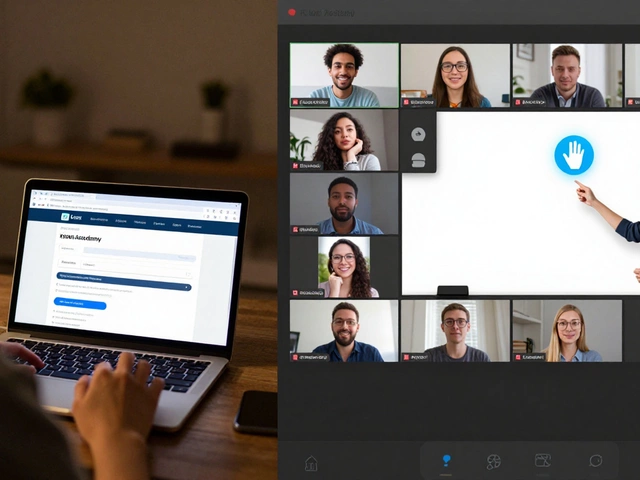eLearning has become a huge part of how we learn today. You probably have come across it in one form or another, especially with the rise of digital education platforms. From language apps to complex courses on platforms like Coursera, eLearning is reshaping the way we gain knowledge.
Why's it so popular? For starters, it's incredibly flexible. Whether you need to brush up on your Python coding skills or want to learn Spanish from scratch, there's likely an eLearning platform that suits your needs. The real kicker is you can access these resources anytime, anywhere. That's a game-changer, particularly for busy folks who can't commit to traditional class schedules.
In this piece, I'm going to walk you through some popular eLearning platforms, share the benefits of going digital with your education, and give you tips on picking the right platform. Whether you're a lifelong learner or looking to get ahead in your career, there's something in the eLearning world for you.
- The Rise of eLearning
- Popular eLearning Platforms
- Benefits of eLearning
- Choosing the Right eLearning Platform
The Rise of eLearning
eLearning has come a long way, and it's only getting bigger. It's not just a trendy thing anymore; it's a crucial part of education all around the world. Back in the early 2000s, online education was just starting out. Now, with the internet becoming a staple in households, eLearning has skyrocketed.
The shift really accelerated about a decade ago, but the real game-changer was when traditional education had to adapt rapidly due to the COVID-19 pandemic. Suddenly, everyone from schools to universities and professional institutions had to move online, and this showed the true power of eLearning. A study in 2022 by Online Learning Consortium found that over 5.8 million students in the U.S. alone were enrolled in some form of online courses.
eLearning platforms have made knowledge more accessible than ever. No matter if you're in a major city or a rural area, if you've got internet, you can learn almost anything. That's wild! It means that quality education isn't just for the privileged few anymore, but available for anyone with a drive to learn.
The Power of Technology
Advancements in technology have taken eLearning to the next level. Tools like virtual classrooms, interactive quizzes, and video tutorials have changed the way we approach learning. Platforms like Duolingo made language learning feel like a game. Meanwhile, sites like Khan Academy are a treasure trove for students and teachers alike, offering free lessons that cover an impressive range of subjects.
Those days when learning meant sitting in a classroom with a textbook are history. Now, you can engage with content that's dynamic and interactive. This engagement is key because it helps with understanding and retention.
Accessibility and Flexibility
The flexibility offered by eLearning is hard to beat. People can choose when, where, and how they study. This is a massive win for working professionals and parents who are juggling multiple responsibilities. The ability to pause and resume learning anytime means you control your educational journey.
eLearning platforms cater to different learning styles as well. Whether you're a visual learner, prefer auditory instructions, or need hands-on tasks, there's something for everyone. Some platforms even offer personalized learning paths, which is like having a tailor-fit course designed just for you.
eLearning isn't just a sidekick to traditional education anymore. It's standing strong on its own, proving to be quite effective and equally impactful. And with technology continuously evolving, who knows what the future holds? Whatever it is, you can bet eLearning will be right at the heart of it.
Popular eLearning Platforms
When it comes to eLearning platforms, there's a plethora of options out there, each catering to different needs and interests. Let me introduce you to a few heavy hitters in the online education space.
1. Coursera
Coursera partners with top universities and companies to provide a wide range of courses across many disciplines. Whether you're interested in data science or humanities, there's a course for you. Many of these courses offer certifications, making it a popular choice for professionals looking to boost their resumes.
2. Udemy
Udemy is known for its massive library of courses, on just about any subject you can think of. It's a marketplace for instructors to create courses, so there's a great variety in teaching styles and topics. It's perfect for self-paced learning, giving you the flexibility to learn when it's convenient for you.
3. Khan Academy
If you're looking for something that's both high-quality and free, Khan Academy might just be your best bet. It focuses primarily on K-12 education but has materials on a lot of subjects, including college-level math and science. Their interactive exercises are especially helpful for students who need more hands-on practice.
4. Duolingo
For language learners, Duolingo has gamified the learning process, making it fun to pick up new languages. You can learn casually with just a few minutes each day. It's perfect for anyone looking to add a new language to their skill set without the pressure of formal classes.
All these platforms make online education more accessible and tailored to personal learning styles. They're great for those balancing busy lives but still foster a thirst for knowledge. So whether you want to climb the corporate ladder or simply enrich your mind, there's an eLearning platform waiting for you.

Benefits of eLearning
So, what's the big deal with eLearning? Let's break it down. First off, the flexibility is unmatched. You can learn at your own pace, whether you're slow and steady or like to power through lessons. This makes it super accommodating for everyone from full-time students to busy professionals. No need to juggle your schedule to attend a fixed class.
Another huge perk is accessibility. With the internet, learning isn’t confined to the classroom. You can access educational content from anywhere in the world. This is especially crucial in parts of the world where traditional schooling options may be limited.
Let's not forget about the variety. From online education platforms offering short courses to full degree programs, there's something for every niche and interest. Platforms like Khan Academy offer free resources, while others like edX and Coursera partner with universities for more structured learning. The choices are endless!
Cost-Effective Options
Education can be expensive, but digital learning can cut down costs significantly. Many platforms offer free trials, low-cost courses, or even scholarships. Plus, the money you save on commuting and physical materials adds up quickly.
Constant Updates
Unlike textbooks that might take years to update, eLearning materials can be refreshed regularly to ensure you're getting the latest information. This is crucial in fast-evolving fields like technology, where staying current is key.
Interactive and Engaging
Many eLearning platforms use gamification, quizzes, and interactive content to keep you engaged. It's not just reading endless PDFs; it's learning by doing.
Here's a quick look at how the flexibility of eLearning compares to traditional education:
| Aspect | eLearning | Traditional Education |
|---|---|---|
| Flexibility | High | Low |
| Cost | Variable, often lower | Generally higher |
| Access | Global | Location-dependent |
All this makes eLearning a fantastic option whether you’re looking to improve your career skills or just exploring a new hobby. So next time you’re thinking about learning something new, consider going the online route. It might just be the perfect fit for you!
Choosing the Right eLearning Platform
Choosing the right eLearning platform can be a bit like sorting through an all-you-can-eat buffet—there are so many options, it can get overwhelming! But hey, stick with me and I'll simplify things for you.
Define Your Goals
First off, you need to know what you're aiming for. Are you prepping for a career change, or just looking to pick up a new hobby? Different platforms cater to different needs. For serious certifications and degrees, platforms like Coursera or edX are gold mines. For niche learning, Udemy and Skillshare have a more relaxed atmosphere, covering everything from coding (trust me, lots of coding) to watercolor painting.
Check Out the Content
It's crucial to peek at the course content before diving in. Make sure it aligns with what you want to learn. Most platforms try to showcase previews or syllabuses. That's your chance to see if the teaching style clicks with you—no one wants to sit through lectures they can't follow.
Price and Your Budget
Alright, let's talk money. Some platforms are subscription-based, others require one-time payments per course. Platforms like Khan Academy are totally free and a real gem for school-level subjects. Then there's LinkedIn Learning, often pricey but worthwhile if you're the kind of person who'll use it a ton.
Ease of Use
Lastly, user experience matters more than you might think. Does the app or website feel intuitive? Is it easy to track your progress and revisit previous lessons? If a platform frustrates you every time you log on, it might derail your plans to learn.
Here's a quick comparison of popular platforms based on features:
| Platform | Content Variety | Cost | Free Trial |
|---|---|---|---|
| Coursera | Wide (Universities) | Subscription | Yes |
| Udemy | Varied | Per Course | No |
| Skillshare | Creative, Professional | Subscription | Yes |
So, there you have it. Think about your goal, budget, and the user experience when picking a platform. Dive into the world of online education with confidence!



